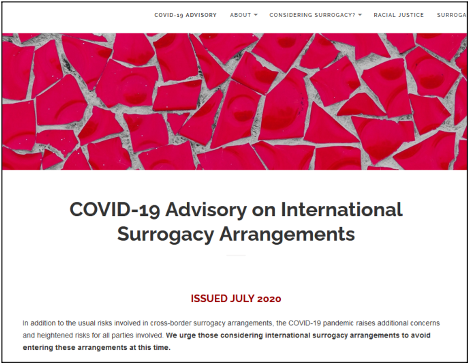Business Not As Usual: Surrogacy in the Time of COVID and Beyond

Entering into surrogacy arrangements during the COVID-19 pandemic is unwise and unsafe. It creates unnecessary risks and challenges for surrogates, egg providers, babies born, and intended parents. Additionally, the pandemic exacerbates power imbalances that existed pre-COVID between intended parents, and surrogates and egg providers. Economic, employment, and other inequalities are now more evident and consequential. These inequities are even more pronounced in international surrogacy arrangements, where the economic disparity between parties tends to be higher.
In the midst of the pandemic and stressed medical systems, women who become surrogates or egg providers may not be able to easily access the medical care they need. If they experience what they think are non-emergency complications, they may avoid medical visits to reduce COVID exposure. Surrogates may have limited access to activities that would support their health and the health of the fetus during pregnancy. And they may face new pressures: In some countries, surrogates have been required to move away from their families to the city where they will give birth, which can lead to social isolation due to shelter-in-place regulations or recommendations.
At the beginning of the pandemic, thousands of infants were stranded around the world because travel restrictions and border closures prevented their intended parents from picking them up. Some of the babies were cared for in hotels or medical facilities; by babysitters, medical staff, or representatives of surrogacy agencies; or by surrogates themselves. The current global surge in COVID cases could trigger new travel restrictions, again leaving babies separated from their parents, often for extended periods.
The pandemic can mean that intended parents face extra administrative challenges, unexpected costs, and significant anxiety in surrogacy arrangements. For months, in addition to barred travel, many were not able to obtain the paperwork they needed to bring their child home or for their child to be recognized as a citizen of their home country. These challenges may continue or resurface, sometimes in unexpected ways.
Industry’s response to COVID
Surrogacy is a multibillion-dollar international industry. Prior to and now during COVID, agencies and clinics focus on their bottom lines and the interests of their paying clients, the intended parents. Egg providers and surrogates continue to be lower priorities.
Many US fertility clinics that suspended operations early in the pandemic re-opened sooner than was judicious, resuming arrangements with egg providers and surrogates even though it posed greater risk of exposure. At the beginning of shelter-in-place regulations, clinics worked to assist parents to pick up their children in other countries, but put little focus on conditions for surrogates or egg providers. This has long been the case: Those whose bodies make surrogacy possible are greatly affected but have fewer resources.
The online video news site Newsy recently covered the state of international surrogacy during the pandemic. In Fertility Industry Growth Expected Despite COVID-19 Headwinds, the managing director of a clinic acknowledges major challenges to international arrangements during COVID. Yet, as noted by reporter Bianca Facchinei, his institute continues to accept international clients anyway. I am interviewed in the story as well, pointing to the COVID-19 Advisory posted at Surrogacy360 (a project of the Center for Genetics and Society), which recommends against entering into international arrangements during this time. I also note that the myriad issues that have surfaced during the pandemic reflect challenges and difficulties that existed pre-pandemic.
COVID and the future of the surrogacy industry
Newsy’s Facchinei astutely concludes her story with the sobering prediction that lack of regulation may mean that the surrogacy industry will be one of the few industries that won’t change at all after the pandemic.
Before COVID, changes to the surrogacy industry were urgently needed – in particular, regulations to prioritize the health and rights of surrogates, egg providers, and people born of surrogacy. Serious additional challenges have surfaced during the pandemic. Now and post-pandemic, let’s avoid hurtling toward “business as usual with some tweaks.” Instead, we can bring together policymakers; health, rights, and justice advocates; and all parties involved in surrogacy arrangements to finally develop comprehensive regulation.



